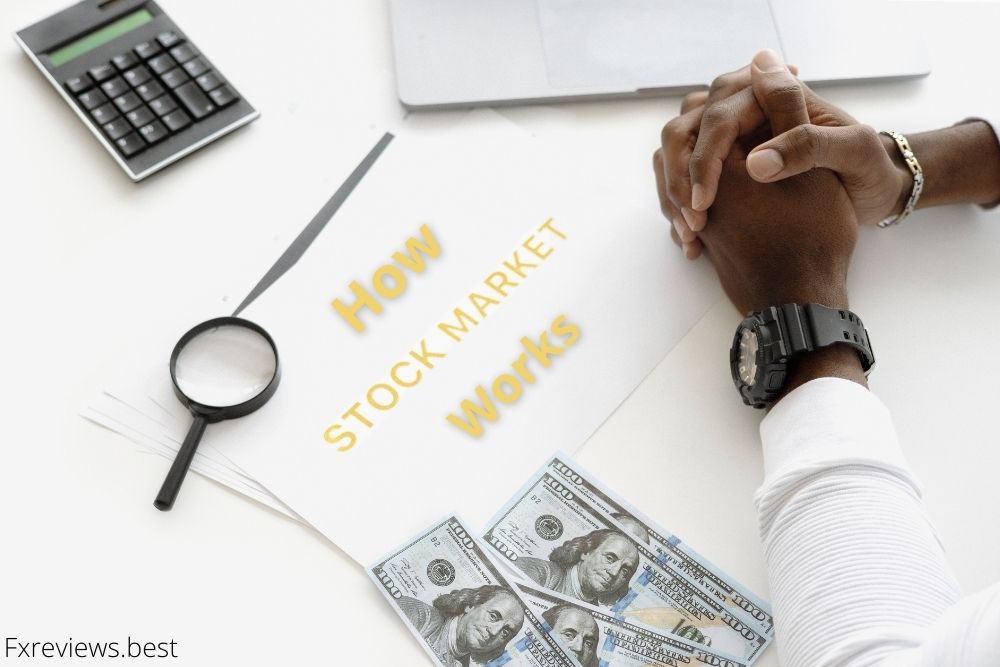How stock market works? What is stock trading? How to invest in stock market? The Stock market is a platform where buyers and sellers come together to exchange shares for generating good returns. When we are talking about financial wellness some common terms we hear are earning, saving, investing, and protecting. Investing in the stock market is the best source of generating quick profits. The stock market can be volatile and it may also consist of inevitable ups and downs. It may also consist of a certain type of risk.
The stock market is a great source of creating wealth over a particular time period. But Do you ever think about how the stock market works? and in what terms does the stock market different from stocks exchange or stock indexes? In this article, we are going to provide you with complete details about the stock market and how it works. Before talking about how stocks market works, we need to understand what stocks?
What are stocks?
The stocks stand for ownership interests in businesses that select to have their shares available to public investors. It is well known as equities or publicly traded companies. A share of stocks shows an ownership interest in a company. For example, If you buy a share of a reputed company, you own a small portion of the business and get some profits from the company’s success. In simple words, in place of being owned by an individual or a private group, some companies prefer to “go public” meaning that anybody can buy ownership by purchasing shares of that company’s stocks.
Basics of Stock Markets
The stock market provides the buying and selling of stocks between traders, institutional investors, and companies. Mostly a wide range of stock trades will be held between investors. Suppose If you want to buy shares of Microsoft and you can fill the buying request via your broker’s website. You can purchase shares that another investor has decided to sell. You can’t buy shares from Microsoft itself. After purchasing stocks you will become a trader in the underlying company. Investors must note that stock prices can vary throughout the day. So be fast at the time of trading before the stock price changes.
How to find out stock prices on the stock market?
Stock prices on an exchange are controlled by supply and demand. Throughout the day, at any minute, Some are willing to pay the maximum price of a particular share, On the other hand, someone is ready to sell shares of the stocks at minimum prices. All these activities are part of the stock market which offer trading like a public sale.
If there is a huge demand for stocks, traders will purchase shares faster than the seller wants to get rid of them. Due to this stock prices will jump higher. Visa versa, if the number of sellers is more than buyers in the market, the stock price will drop. Moving further, It is necessary to know How it’s possible to buy and sell stocks that you own. In this activity, the stock market plays its role.
Resultant of buying and selling stock
Investors should take out the transactions of buying or selling stocks with the help of brokerage, which consists of a legal license to trade stocks on a stock exchange. A broker can be an actual person Whom you can tell what to purchase or sell. Most of the time investors prefer online brokers. Here we provide you a list of some popular and secured brokers. They are the best options for stock market trading because all of them are registered by Cyprus Securities and Exchange Commission. They offer various types of accounts for trading.
- Investlite
- T1Markets
- IGMFX
- Capixal
- TradeATF
When you buy stock, here are the simple steps of how the stock market works.
- Consult your broker via an online mode that what stocks you want to buy and how many shares you want.
- Your broker pas on your request to the exchange and a market manager sells your shares at the recent market prices.
- After that, your shares will be transferred to your account.
Market make sure there are always buyers and sellers
There’s always a marketplace for stocks on a stock exchange to make sure that the market is always loaded with stocks of different companies and investors have options to select stocks to buy and sell shares instantly anytime they want in the market hours, it is particularly known as market makers act instantly between buyers and sellers. Here are some points that investors must know about the process.
- Market makers purchase and hold shares and continually list purchase and sell quotations for stocks.
- The biggest offer to buy stocks listed from a market manager throughout the day is known as the “bid” and the lowest offered selling price is called the “ask”.
- The difference between the bid and ask is known as a spread.
The main motive for using the market maker system is to decrease the simple letting traders buy and sell stocks directly to one another. In this case, you must be sure there is always a buyer to fulfill the requirements of every seller and vice versa. If you are required to sell stocks, you may not need to wait for exact buyers who purchase an equal amount of shares. A marker manager will buy them instantly.
What is a Trading Account? Why Do Traders Require Trading Accounts?
A trading account is an online trading account that investors use to buy and sell securities and monitor trades. It permits traders to buy and sell shares, commodities, foreign exchange, and so on in the stock market. A trading account may also be known as the primary account for a day trader. Day traders purchase and sell financial instruments on a daily basis, always between regular trading hours. Due to this, their accounts have access to special regulatory features.
When trading accounts were not introduced, Investors needed to present physically on the trading floor of stock exchanges for buying and selling shares, commodities, and so on. This style of trading was known as an open outcry. In this system, traders are required to make deals through verbal communication with sellers on the trading market.
After the launch of the electronic trading system, the open outcry system was replaced by online trading accounts. They provide various facilities to the investors for buying and selling online without the requirement of physical presence. They also provide securities in their electronic form in place of physical certificates.
Key Factors Why Investors Need a Trading Account?
There are various benefits of having a trading account because a trading account provides facilities for buying and selling securities on a stock exchange market. Open an trading account with most trusted broker TradeATF
Multiple Stock Exchange Trading
Due to online trading account traders need to present physically on the trading platform of a stock exchange. In place of this, they have control of various stock exchanges through one account across the world. A trading account permits the traders to submit and withdraw funds through their online trading account. They can easily place orders, monitor their stock activities from one device from all over the world.
Control to research reports and business news
An online trading account provides various tools to get the latest updates of business news. The account may also provide financial and research reports of the top publicly traded companies to their users which helps in improving your investment strategy and financial moves. Finance related information is also available with the account for beginners’ help.
How does the stock index track the stock market?
You mostly heard terms such as “The market is up” or that a stock ” beat the market”. We use these terms generally when we are talking about the market to a stock index. Stock indexes such as the S&P 500 or the Dow Jones Industrial Average are a characterization of a large group of stocks and are utilized as a benchmark to differentiate the performance of individual stocks or an entire portfolio. Like the S&P 500 index following the performance of 500 of the biggest publicly traded companies of the U.S.
Indexes are the most suitable way to describe an approximation of what is going on in the market, But it’s necessary to understand that the major stock market indexes which are shown on TV and in the news do not show a complete stock market.
Stocks markets, stocks indexes, and stock exchanges
Above mentioned are three different terms which are used for similar but always misleading meanings. A stock market stands for the process and facilitation of traders buying and selling stocks with each other. A stock exchange is like a bridge that links buyers with sellers like the New York Stock Exchange (NYSE). A stock market index is a description of a bunch of stocks through which we can track collective performance.
Difference between primary stock market & secondary stock market
Primary Stock Market
A primary market is a place where shares are listed by a private company on the stock exchange. For the company, the objective of a primary market is to increase capital for expansion and strategic operations. A Primary market provides an opportunity to the investors and traders to get on the lower level of the company and take profits of any growth the company might experience.
Different types of primary markets are:
- Initial Public Offering (IPOs): They provide the first opportunity investors need to purchase a share of a private company. The process is under control by an investment bank that will issue shares. Most of the timeshares will be issued only for institutional investors at a particular price. Once the shares are listed on the stock market, the firm will become a publicly-traded company.
- Rights problems and placings: In this process, an already publicly traded company lists extra shares onto the market to enhance further funds for the public. The stock offer is delivered to the most suitable investors whether they are current shareholders or not.
Secondary Stock Market
A secondary market is a place where existing shares are traded between investors. Once a company’s stocks are released in the primary market. The buyer is free to trade them with the market participants and negotiate share prices among themselves.
The company will not get any money from the secondary market, as any capital produced from the share will be transferred to the investor who is selling their holdings. Investment banks and brokers play the role of link for transactions. Most stock exchanges do not permit particular investors to directly trade into their order books. There is no limit on the trading shares in the secondary market.
Factors showing movement in the stocks prices
The stock prices are operated by the supply and demand for a company’s share in the market. When the request for share increases and outstrips the supply in the market. This happens due to the high volume of demand. The stock price will likely increase. When the number of sellers increases in comparison to buyers, it will reduce the share price.
When each particular stock consists of its trajectory and is moved by the unique fundamental factors, the stocks will widely move together. Due to this exchange sentiment and macroeconomic data were issued. Here we provided you complete details of each data:
- Fundamentals: Financial Data and features of a company help us to understand the overall condition of a company. Most investors take help from earning releases and a company balance sheet to sum up its fundamentals that affect their returns like price to earnings (P/E) ratios and earnings per share (EPS). If the company consists of strong fundamentals, increase the metric of revenue, profits, sales, and many more. Due to this the company stocks are more appealing to investors.
- Events and news affect the buying and selling decisions of the traders. Factors such as negative company news, earnings reports, political uncertainty, and natural disasters will definitely increase selling pressure in the market. On the other hand, positive news enhances bullish sentiments.
- Market Sentiment: as per the general advice about the stocks or the stock market. These respected attitudes can increase depending on a variety of factors which involves fundamentals, news, and
- Macroeconomic factors like interest rates, inflation, and economic data all influence the outlook for a particular firm and the stock market in normal. If the economic outlook is not good, investment moves towards decrement and costs of shares fall down.
How many stock exchanges are present?
Nearly 630,000 companies are traded on a stock exchange all over the world. To provide trade of stocks and shares, each region consists of various exchanges. There are 60 major exchanges available across the world. In 2015 nearly 16 exchanges created 87% of worldwide market capitalization.
Some of the major stock exchanges are:
- The London stock exchange was introduced in London in 1801.
- The New York Stock Exchange was founded in 1792 which is the biggest in the world.
- NASDAQ is one of the major U.S. based exchanges founded in 1971.
- Japan Exchange Group is a fusion of the Tokyo Stock Exchange and Osaka Securities Exchange.
What are stock market indices?
The stock market always puts effort into maintaining the overall condition of the worldwide economy. Although, The stock market was introduced to see how it’s performing overall. They show a portion of all the firms on a selected stock exchange and check how good and poorly they are giving results.
So when the single company performs and share prices only display a suffocated view of the market. A stocks market index provides a perfect overview of the market. There are two types of indices present such as global and regional indices. For example, The Dow Jones Industrial Average tracks the performance of the 30 largest companies of America which involves Apple, Coca-Cola, and Boeing. Other examples are, The Financial Times Stock Exchange (FTSE) 100 Index is a line of the 100 biggest firms on the London Stock Exchange.
Stock Index is not only designed to provide an overall view of a selected exchange and economy But also designed a list of funds in which traders can invest. So it is profitable to invest in market index funds that track the performance of various stocks in comparison to directly investing in one or various firms. Investors must note how stock market works very actively throughout the day but investing in the stock may consist of high risks, so try to invest the amount which you can afford to lose.
How Stock Market Works?
Do you ever think about how the stock market works exactly? We all follow some of the common principles of trading stocks, shares, and the stock market. In simple words, The stock market functions similarly to the auction house which means buyer and seller settle prices and trade happens. Here we explain to you how the stock market works with the help of two easy examples.
For Individuals
- A trader makes mind either they want to buy a share of a company or invest in an index fund.
- They open accounts on a brokerage platform or with a stockbroker. From there they get complete information about stocks.
- On brokers platforms, they will get a list of shares and stocks from which they can purchase stocks, share on the demanded costs.
- Market variable stands for the fluctuation of the cost which moves up and down on the basis of multiple factors.
- At the time when the investor decided to sell their shares. The difference between the buying and selling costs help us to make a judgement whether they make a profit or loss.
For companies
- It is the company’s decision whether they want to sell shares in the business to generate funds for an upcoming project.
- The company arranges an initial public offering (IPO) of its stocks, selling shares on the primary market platform.
- After the share is handed over to the public shareholders, they can be sold and purchased unlimited time on an exchange.
- As a transaction takes place to purchase or sell stocks, the exchange follows the flow of demand. It may also trace the demand and supply of a particular share and find the costs of stocks.
Factors that affect the market
Definitely, the factors mentioned above do not always lead to the path of success of an investment. The Stock market may also consist of other factors such as huge losses, sudden downfall, or an economic bubble bursting.
In complete history, there have been many stock market crashes listed. History may also consist of a double-digital percentage drop of a stock index is hardly one or two days. Here we provide you with some stock market drop examples which take place over the years.
- The Wall Street Crash of 1929 was held between September and October 1929. This time the US market faced the largest sell-off of shares. People lost their savings, banks went bankrupt. It shows the huge depression.
- Black Monday of 1987. This incident took place in October 1987 when US stock markets dropped 20% on a particular day with an estimated loss of nearly $1.71 trillion globally.
Conclusion:
Stocks market is a place where investors buy or sell stocks, shares and many more. Investing in stocks consists of high risks So for your help we provided you with complete details about How stock market works? Check here Factors that affect stock market movement. You may also get here knowledge about the Stock index, stock exchange, and the stock market.



